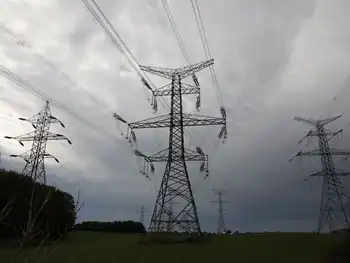Doubts are raised on re-regulation
BALTIMORE, MARYLAND - Re-regulating Maryland's power industry might be politically popular in the face of rising rates, experts say, but would be legally complicated, potentially costly and would not necessarily result in lower energy prices.
The idea of re-regulation has gained steam during the past month as the prospect of a 72 percent rate increase this summer by Baltimore Gas and Electric Co. all but consumed the recent session of the Maryland legislature.
Douglas M. Duncan, the Montgomery County executive and Democratic gubernatorial candidate, called for re-regulating the power industry and imposing rate limits, setting himself apart from the other major candidates in the race, Republican Gov. Robert L. Ehrlich Jr. and Democratic Baltimore Mayor Martin O'Malley.
Two bills introduced during the legislative session also called for some form of re-regulation to counter rising energy costs, but they fizzled as officials focused on the more immediate problem of easing this summer's rate increase.
Ehrlich is negotiating with Constellation Energy Group Inc., the parent of BGE, on a possible phase-in for the rate increase.
The longer-term alternative of re-regulating the electric industry would be far from simple, analysts say.
The move to competition forced utilities to transfer their power plants to unregulated affiliates or sell them. Getting the plants back -- assuming regulators could force such a move -- would be costly at today's prices. And the alternative of building plants could also be expensive and time-consuming.
"It's a little like trying to put the toothpaste back in the tube," said Jay Apt, a utility expert at Carnegie Mellon University in Pittsburgh.
Maryland joins several other states, including Ohio and Delaware, that are exploring ways of reversing free-market reforms of the late 1990s.
Constellation officials say it is too soon to give up on deregulation. There is still time for competition to take hold in Maryland, which could lead to lower prices in the long run, they say. At least two companies have proposed to serve BGE customers at lower rates once the rate limits end in July, and more are exploring the market.
"Before we talk about re-regulating, we should be looking at the fact that we've really not allowed the marketplace to take hold," said Rob Gould, a Constellation spokesman.
Duncan offered no specifics for his proposed re-regulation plan, saying the mechanics would have to be worked out through a public process involving experts and consumer groups. But the plan would include regaining control of the power-generating plants that BGE and other Maryland utilities gave up as part of deregulation, he said.
"Clearly, it's something we can do," he said in a telephone interview. "But it needs to be worked out in the light of day, not in these backroom meetings the governor is having with BGE."
After deregulation in 1999, BGE had to transfer ownership of its power plants to an unregulated arm of its parent, Constellation Energy Group. Those plants sell power to the highest bidder in the wholesale market, which is outside state jurisdiction and is overseen by federal regulators.
Potomac Electric Power Co., which serves Montgomery County and most of Prince George's County, sold its power plants to Mirant Corp., making any attempts to get them back constitutionally questionable because, unlike with BGE, no affiliate of the company retains ownership.
The Maryland Office of the People's Counsel recently announced that it had reached a settlement with Pepco and Delmarva Power and Light Co. to allow their residential customers to have their impending rate increases phased in over 18 months, the Associated Press reported. Delmarva serves Maryland's Eastern Shore. The plan is subject to approval by the state Public Service Commission.
Forcing Constellation to return its power plants to BGE would be much more difficult, utility experts said. The U.S. Constitution prevents states from taking private property without compensation. Even if Constellation were compelled to return them, the company would expect to be paid a fair market price, and that has gone up considerably.
Power-generation plants -- especially nuclear plants such as the Calvert Cliffs station -- have soared in value because the cost of the electricity they produce has increased in recent years.
"Those plants have gotten to be very profitable, and, indeed, if you're going to buy them back, you probably would need to pay a premium," said Charles Gray, executive director of the National Association of Regulatory Utility Commissioners, which represents state regulators. The state could try to argue that BGE customers have paid for the plants through the rates they paid under decades of regulation.
Customers paid for them a second time as part of deregulation, when they compensated the company for $528 million of so-called stranded costs, said Sue Kelly, general counsel for the American Public Power Association, which represents municipal utilities.
But those arguments would probably be challenged in court, which could mean lengthy litigation dragging on indefinitely before a fair price was determined.
The question then would become whether such a plan would result in lower rates for consumers, after factoring in the potential billions of dollars that would be required to take back control of the power plants. Ratepayers would have to repay those expenses.
"It's not a slam dunk that it's going to be less expensive," Gray said.
Building plants also poses challenges, utility experts said. Plants generating enough power for all or most of Maryland would take years to build, cost billions and raise a number of environmental concerns. Finding sites for such plants also would be difficult.
Ratepayers would again be responsible for paying for all of the maintenance and upkeep of those plants, something they avoid under the current system.
Constellation says it has spent more than $1 billion on plant upgrades since 1999 and must spend $600 million to $800 million more as a result of a new state clean air bill passed last session. Under deregulation, shareholders bear those costs, not ratepayers.
"You still would be basically starting from scratch," said Kenneth Rose, an independent energy consultant in Ohio.
There are other alternatives, such as having a utility or a state- created power authority build a few gas-fired "peaking" power plants, generally gas-fired plants that can be put into operation during hot months when demand for electricity is high.
Access to such plants could help BGE negotiate better rates from power suppliers, which wouldn't have to supply the utility with as much energy during times of peak demand, when prices in the wholesale market soar.
Another possible solution would be to end retail competition and allow BGE and other Maryland utilities to enter into long-term supply contracts with generators, rather than going through the more volatile reverse auction process that helped lead to this summer's price increase.
That would avoid the problem of acquiring new plants while possibly leading to lower rates.
Utility experts, however, point to studies suggesting that electricity rates would be just as high if Maryland had never deregulated its power industry, raising questions about what would be gained from re-regulating.
Officials who oversee the wholesale market in Maryland and 12 other states point to data showing that rising costs for natural gas and coal are to blame for higher electricity rates, and that the cost of generating power has declined in recent years as a result of competition. Rising fuel costs would be passed through to consumers even under traditional regulation, they point out.
"Anyone who says, 'I have the answer and it's clearly 'X' or it's clearly 'Not X,' then they're fibbing," said Thomas Firey, a senior fellow at the Maryland Public Policy Institute, a nonpartisan research organization that promotes policies based on free enterprise and limited government.
Related News

Cost of US nuclear generation at ten-year low
WASHINGTON - Average total generating costs for nuclear energy in 2017 in the USA were at their lowest since 2008, according to a study released by the Nuclear Energy Institute (NEI).
The report, Nuclear Costs in Context, found that in 2017 the average total generating cost - which includes capital, fuel and operating costs - for nuclear energy was USD33.50 per megawatt-hour (MWh). This is 3.3% lower than in 2016 and more than 19% below 2012's peak. The reduction in costs since 2012 is due to a 40.8% reduction in capital expenditures, a 17.2% reduction in fuel costs and an 8.7%…




